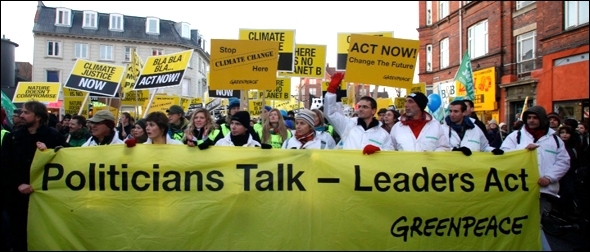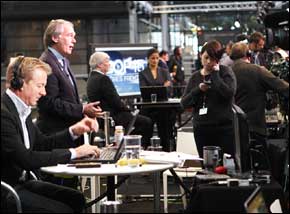Climate Deal Not Accepted By All, But Copenhagen Conference Makes It “Operational”

By Keith Schneider
Circle of Blue
COPENHAGEN—Today 7 countries, led by the tiny Pacific island nation of Tuvalu, declined to accept the Copenhagen Accord that was reached late last night. But in a procedural move designed to put the agreement into effect, the conference decided to “take note” of the accord instead of formally approving it.
NGO experts explained that the decision of those nations that are parties to the conference to “take note” of the treaty enables the accord to become what the United States and other supporting nations call “operational” — though it has not gained formal approval from the United Nations.
Negotiators continued to work to clean up last details, but the Copenhagen Climate Change Conference appeared as though it would conclude later today. In a sense the accord is tantamount to a global pre-nuptial agreement, with the full marriage still to come.
The final stages of the Copenhagen climate conference have produced a range of responses, though none were expressions of celebration. Ban ki-Moon, the secretary-general of the United Nations, called the accord reached last night “hopeful” and urged the 193 nations that gathered here to transform its basic provisions into a legally binding treaty. “It’s just a beginning. It will take more than this to tackle climate change. It is a step in the right direction,” he said.
The U.N. secretary-general said he would press world leaders to complete a legally binding treaty next year. The Copenhagen Accord was negotiated by U.S. President Obama, Chinese Premier Wen Jiabao, and the leaders of Brazil, India, and South Africa. It attracted support from the European Union and most other world leaders. The accord encompassed all of the significant measures that most nations said were needed to respond to climate change, but with steps that many climate scientists and diplomats consider insufficient to keep global temperatures below 2 degrees Celsius, a level thought by many world leaders to be manageable.
The Copenhagen Accord contains these provisions that President Obama called a start to global action to solve climate change:
- A commitment by developed nations to invest $30 billion over the next three years to help developing nations adapt to climate change and pursue clean energy development.
- A provisional commitment by developed nations to develop a long-term $100 billion global fund by 2020 to assist developing nations in responding to climate change and become part of the clean energy economic transition.
- A goal to pursue emissions reductions that are sufficient to keep the rise in global temperatures below 2 degrees Celsius.
- Pledges by nations to commit to concrete emissions reductions, though the specific levels of reduction were not set.
- A general goal to subject participating countries to international review of their progress under the accord.
- Diplomatic space for the United States and China to work together to solve climate change.
- A commitment to complete an assessment of the effectiveness of the accord in reducing emissions by the end of 2015.
The events leading up to making the accord operational followed a long night of controversy in which Tuvalu, Sudan, Venezuela, Cuba and three other nations opposed its provisions, arguing that it did not go nearly far enough to solve the climate crisis. The smaller nations also objected to the process that produced the accord, in which the U.S., China, India, Brazil and South Africa negotiated with 20 other nations. President Obama, who arrived early on Friday morning, put the full measure of his influence and prestige behind the work to reach the accord.
Critics of the accord called it completely inadequate to respond to the dire threat posed by climate change. Cuban delegates said that the U.S. and its new president were “behaving like an emperor” and claimed that the draft was a “gross violation of the principle of sovereign equality.”
At 10:30 p.m. Obama held a news conference and appeared visibly spent. “Today we’ve made a meaningful and unprecedented breakthrough here in Copenhagen,” he said. “For the first time in history, all major economies have come together to accept their responsibility to take action to confront the threat of climate change.”
Obama added: “Because of the actions we’re taking, we came here to Copenhagen with an ambitious target to reduce our emissions. We agreed to join an international effort to provide financing to help developing countries, particularly the poorest and most vulnerable, adapt to climate change. And we reaffirmed the necessity of listing our national actions and commitments in a transparent way. These three components — transparency, mitigation, and finance — form the basis of the common approach that the United States and our partners embraced here in Copenhagen. Throughout the day we worked with many countries to establish a new consensus around these three points, a consensus that will serve as a foundation for global action to confront the threat of climate change for years to come.”
Keith Schneider, a former New York Times national correspondent, is senior editor and producer at Circle of Blue. Contact Keith Schneider
Read the previous installments of Schneider’s COP15 blogging here, here, here, here and here. Be sure to check out all of Circle of Blue’s Copenhagen coverage, including other features and videos.
Circle of Blue’s senior editor and chief correspondent based in Traverse City, Michigan. He has reported on the contest for energy, food, and water in the era of climate change from six continents. Contact
Keith Schneider











Leave a Reply
Want to join the discussion?Feel free to contribute!